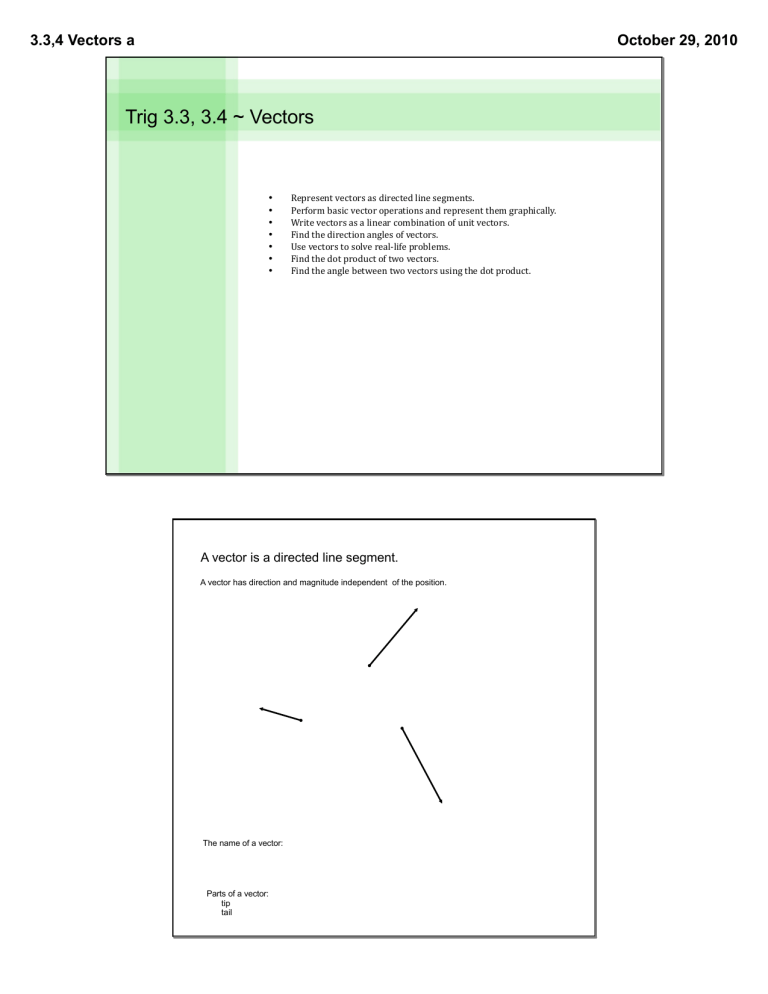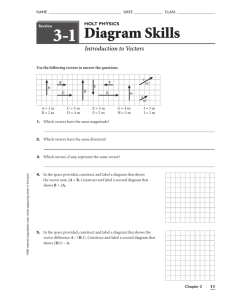Document 11235311

3.3,4 Vectors a
Trig 3.3, 3.4 ~ Vectors
•
•
•
•
•
•
•
Represent vectors as directed line segments.
Perform basic vector operations and represent them graphically.
Write vectors as a linear combination of unit vectors.
Find the direction angles of vectors.
Use vectors to solve real-‐life problems.
Find the dot product of two vectors.
Find the angle between two vectors using the dot product.
October 29, 2010
A vector is a directed line segment.
A vector has direction and magnitude independent of the position.
The name of a vector:
Parts of a vector: tip tail
3.3,4 Vectors a October 29, 2010
Two vectors are the same if they have the same direction and the same magnitude independent of position.
Opposite vectors have the same magnitude and opposite directions.
Select the two equivalent vectors:
Select the two opposite vectors: a b c d e f g
For vector v
||v|| represents the magnitude or length of the vector.
represents the direction angle of the vector.
In General:
||v|| The magnitude of a vector is found using the Pythagorean Theorem on the
coordinates of the endpoints of the vector.
The direction angle is found with trigonometry by using arctan to find the
reference angle, then placing the angle in the correct quadrant.
3.3,4 Vectors a
We will consider vectors in three forms:
1. Described by the coordinates of the tail and the tip.
v = AB where A has coordinates (-3,-2) and B has (1,5).
2. In standard position, placing the tail on the origin and stating the coordinates of the tip.
v is 〈 〉 in standard position.
3. Describing the magnitude and direction of the vector.
v = ||v|| 〈 cos , sin 〉 where is the angle of the vector in standard position.
October 29, 2010 u = 〈 3,2 〉 v = 〈 -2,1 〉
Vector arithmetic:
A vector may be multiplied by a scalar.
3 u =
-2 v =
Two vectors may be added by adding their components.
u + v = u - 2 v =
3.3,4 Vectors a
Vector arithmetic is easier to visualize geometrically:
When adding two vectors, place them tail to tip. The resultant is the vector from the tail of the first to the tip of the last.
u = 〈 3,2 〉 v = 〈 -2,1 〉
3 u =
-2 v =
October 29, 2010 u + v = u - 2 v =
3.3,4 Vectors a
UNIT VECTORS
The unit vectors, i and j give us one more way to express our vectors.
October 29, 2010
Vectors: The dot product.
The dot product of two vectors provides a formula which will help find the angle between
two vectors.
If u = 〈 u
1
,u
2
〉 and v = 〈 v
1
,v
2
〉 then u º v (pronounced u dot v) = u
1 v
1
+ u
2 v
2
.
It is a scalar quantity.
So given vectors u = 〈 3,-2 〉 and v = 〈 -4,1 〉
Find the dot product:
The cosine of the angle between the two vectors is the dot product divided by the product of the magnitudes of the two vectors.
cos ø =
Find the angle between the two vectors above:
3.3,4 Vectors a
Orthogonal vectors: If two vectors are perpendicular to each other they are said to be orthogonal. What would the cosine of two orthogonal vectors be?
October 29, 2010
Orthogonal or not?
〈 3,-2 〉 and 〈 1,4 〉
〈 4,-6 〉 and 〈 -3,-2 〉
Application problem 1: - flying an airplane.
A plane is flying N 30º E at 400 mph and the wind is blowing west at 40 mph.
What is the effective direction and speed of the plane?
Draw a picture.
Place your vectors for proper addition.
Remember the resultant is from the tail of the first to the tip of the second.
3.3,4 Vectors a
Application problem 2 forces acting on an object:
Two forces are pushing on an object, one exerts 30 lbs of pressure and a second exerts
20 lbs of pressure. The angle between the two forces is 70º. What is the resultant force on the object?
October 29, 2010

